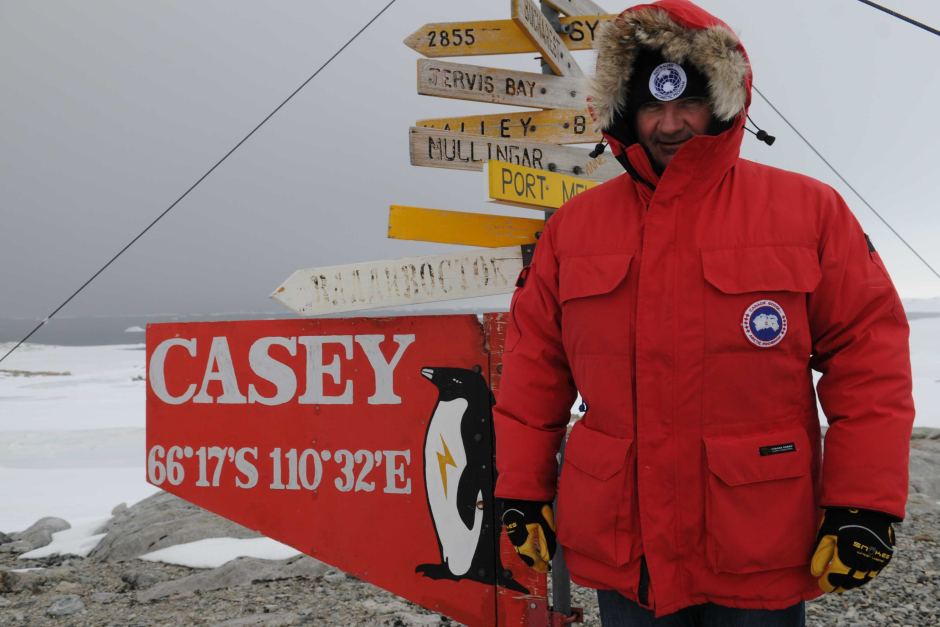Category: Human Interest / People / Mining Industry / Science / Careers
Have you ever wondered what it's like working in Antarctica?
Wednesday, 4 Jan 2017 16:12:34 | Karen Michelmore

Paul Ross is the station leader of the Casey Research Station (Supplied: Australian Antarctic Division)
Paul Ross might have the coolest job in the world.
He has been the station leader for Casey Research Station, in Antarctica, for the past couple of months.
"This is my first time here, so the first impressions are pretty awesome," he said.
"You kind of slowly get used to that, but it's still quite amazing. You have to sort of pinch yourself."
Mr Ross has taken leave from his career as an inspector with the Victorian police force, and moved to the coldest, windiest and driest continent in the world.
If bitter blizzards and minus 40-degree Celsius temperatures sound appealing, then the Australian Antarctic Division may have the perfect job for you.
It is currently on a recruitment drive to fill 100 jobs.
Human resources manager Andrew Groom said the division was looking for electricians, plumbers, carpenters, chefs, and doctors for a new team of expeditioners for the 2017/2018 season.
Good technical skills are important, as is a tolerant and resilient personality.
 Photo:
Research assistants feed out a diver's umbilicals as he disappears through the ice near Casey station. (Kristin Raw: Australian Antarctic Division)
Photo:
Research assistants feed out a diver's umbilicals as he disappears through the ice near Casey station. (Kristin Raw: Australian Antarctic Division)
There are 469 people working on Australia's Antarctic Program — one in five are scientists and the rest work in trades and support roles.
"The main purpose of our work is to protect Australia's interests in Antarctica, but also to undertake a range of scientific research," Mr Groom said.
"In terms of the scientific work we do, it can range from research into penguins, seals, other marine life, moss and weather conditions, ice conditions. There's a whole range of scientific work that goes on."
There are four permanent Antarctic research stations — Casey, Davis and Mawson on the continent, as well as Macquarie Island in the sub-Antarctic.
All four are occupied year-round, although staff levels drop significantly over the harsh winter.
Most people who apply are looking for a challenge, and an incredible experience, Mr Groom said.
"We get a whole range of different people apply for the jobs, which is fantastic," he said.
"We get people coming out of the mining industry, people from other remote roles, through to people who haven't experienced remote conditions before.
"We get people primarily who are looking for a bit of a challenge and a bit of a change, a bit of diversity in their work, and really the experience of a lifetime is what most of them are after."
Paul Ross said boredom was not a factor and that there was plenty to do, even if there was no TV reception and the internet connection was a little slow.
 Photo:
Paul Ross took leave from his career as an inspector with the Victorian Police Force. (Supplied: Australian Antarctic Division)
Photo:
Paul Ross took leave from his career as an inspector with the Victorian Police Force. (Supplied: Australian Antarctic Division)
There is a ski loop near the station, a cinema and a hydroponic garden growing tomatoes and lettuces.
"We've got just the normal kind of table tennis, pool, a large library, a good gym, a good cardio room," he said.
"We make our own home brew, so we've got a brewery — that takes a bit of time each week to keep that organised.
"Then a lot of us in our spare time help the chefs out in the kitchen and kind of whatever is going on around station we all just kind of chip in and lend a hand when it's needed."
At the moment though, it is the 24-hour sunlight he is getting used to.
"It is a little bit odd if you do wake up at 3:00am and go outside it's bright daylight — it looks like about 2:00pm," he said.
"So it takes a little bit of getting used to, but it's kind of interesting by the same token."
Positions range from six months over the summer months, to up to 15 months, and applications close in three weeks.
- About Us
- |
- Terms of Use
- |
-
 RSS
RSS - |
- Privacy Policy
- |
- Contact Us
- |
- Shanghai Call Center: 962288
- |
- Tip-off hotline: 52920043
- 沪ICP证:沪ICP备05050403号-1
- |
- 互联网新闻信息服务许可证:31120180004
- |
- 网络视听许可证:0909346
- |
- 广播电视节目制作许可证:沪字第354号
- |
- 增值电信业务经营许可证:沪B2-20120012
Copyright © 1999- Shanghai Daily. All rights reserved.Preferably viewed with Internet Explorer 8 or newer browsers.




 Send to Kindle
Send to Kindle